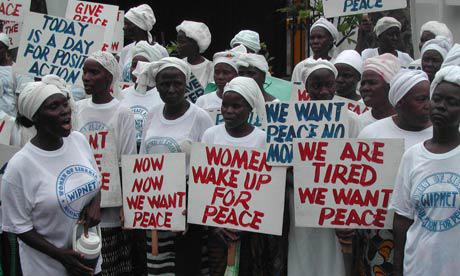A couple of weeks ago one of our heroes, Nobel laureate Leymah Gbowee, gave the commencement address at American University’s School of International Service here in Washington, DC and, of course, our team was excited to hear from her.
Leymah Gbowee was awarded the Nobel Peace Prize in 2011 for her work leading a powerful women’s movement that brought the Second Liberian Civil War to an end in 2003. If you haven’t already, you should definitely check out Pray the Devil Back to Hell, a film made in 2008 about Gbowee and the Liberian women who joined together to bring peace to Liberia. Better yet, read Lehmah Gbowee’s book, Mighty Be Our Powers, which she wrote about the power of women working together against violence.

Over the years, Leymah Gbowee has worked with child soldiers and women affected by violence around the world, helping to lead movements to, as she says, “build peace in a war-making world.” Along the way, she’s learned a few lessons, which she imparted to the graduates of American University.
At Invisible Children, we firmly believe that the best answers to breaking cycles of violence come from the people who are living within them. So, we were excited to hear from Leymah Gbowee and have the opportunity to learn from her as well. We highly recommend that you watch the video of her speech, but if you don’t have 30 minutes, here’s the gist of the lessons she shared:
1. Be persistent, consistent, and committed to your calling.
Peacebuilding is rarely easy, but it’s always worthwhile. To make a difference, you have to be able to continue working for peace even when no one else believes it’s possible. When you can do that, you can make what seems impossible, possible.
2. It’s okay to say that you don’t know the answer.
There are going to be times in all of our lives, especially in peacebuilding, when we won’t have the answers to complex challenges. But that is okay. Sometimes, all we might have to offer is compassion, empathy, and shared humanity. When we don’t have the answers, that’s what we must offer up.
3. Peacemaking is a journey of partnership.
This lesson hits home especially hard for us at Invisible Children because we’ve seen first-hand just how true it is. In order to make the biggest impact you need to team up with experts, leaders, and donors. Even more important, you have to “follow after those you are going to help,” stepping back, creating space for them to lead.
4. You must stand up to hypocritical structures and speak truth to power.
As Leymah says in her speech “Until we decide to turn our upside-down world upright, we’ve missed the mark.” So much of what fuels violence and conflict around the world is the dehumanization of “the other” by those in power. In order to break cycles of violence, we have to fight against that no matter where we see it.
5. Peacebuilding is a process, not an event. So, celebrate the small victories.
Peacebuilding is all about “small steps and small victories.” Ending violence and conflict will take a lot, as Gbowee says. It’s a process that takes the work of generations. We may never get the satisfaction of solving every problem, but it’s imperative that, we recognize the small victories, let our hair down, and celebrate.
6. Take care of yourself.
As Gbowee says “It’s important for us to be a whole person, if we want to keep doing what we are doing.” Peacebuilding is a long process and take a lot of work. In order to finish the journey, we must take care of ourselves along the way.
That’s it. Leymah’s six lessons for building peace in a war-making world. We’re so grateful for powerful leaders like Leymah Gbowee who are changing the world, ending violence, and welcoming us to come along and be a part of it.
We’ll leave you with Leymah’s own closing words:
“Live with integrity. Embrace strangers. Refuse to walk on tiptoes. Walk loudly, leaving an impact on our world. Building peace in a war-making world is not difficult. It takes heart.”
Think people should hear about this?